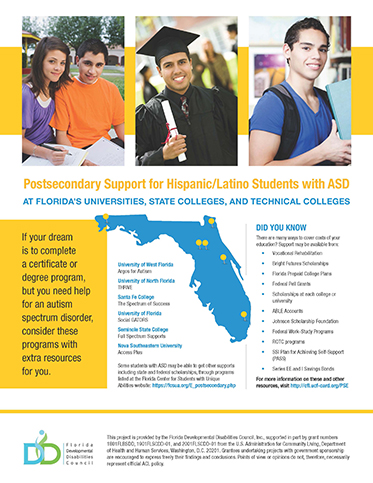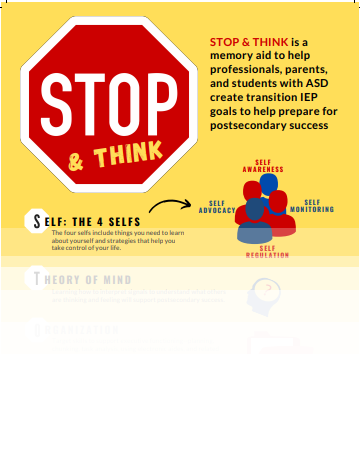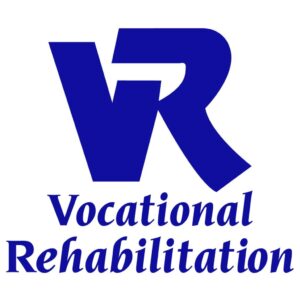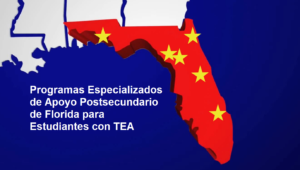For High School Students
How will You help?
Florida's Hispanic/Latino youth with autism spectrum disorders face a cascade of barriers to postsecondary success. Professionals well-versed in transition resources and ASD-specific support strategies can smooth the path from middle grades through postsecondary program completion.
Click here for resources to support postsecondary success for Hispanic/Latino students with ASD
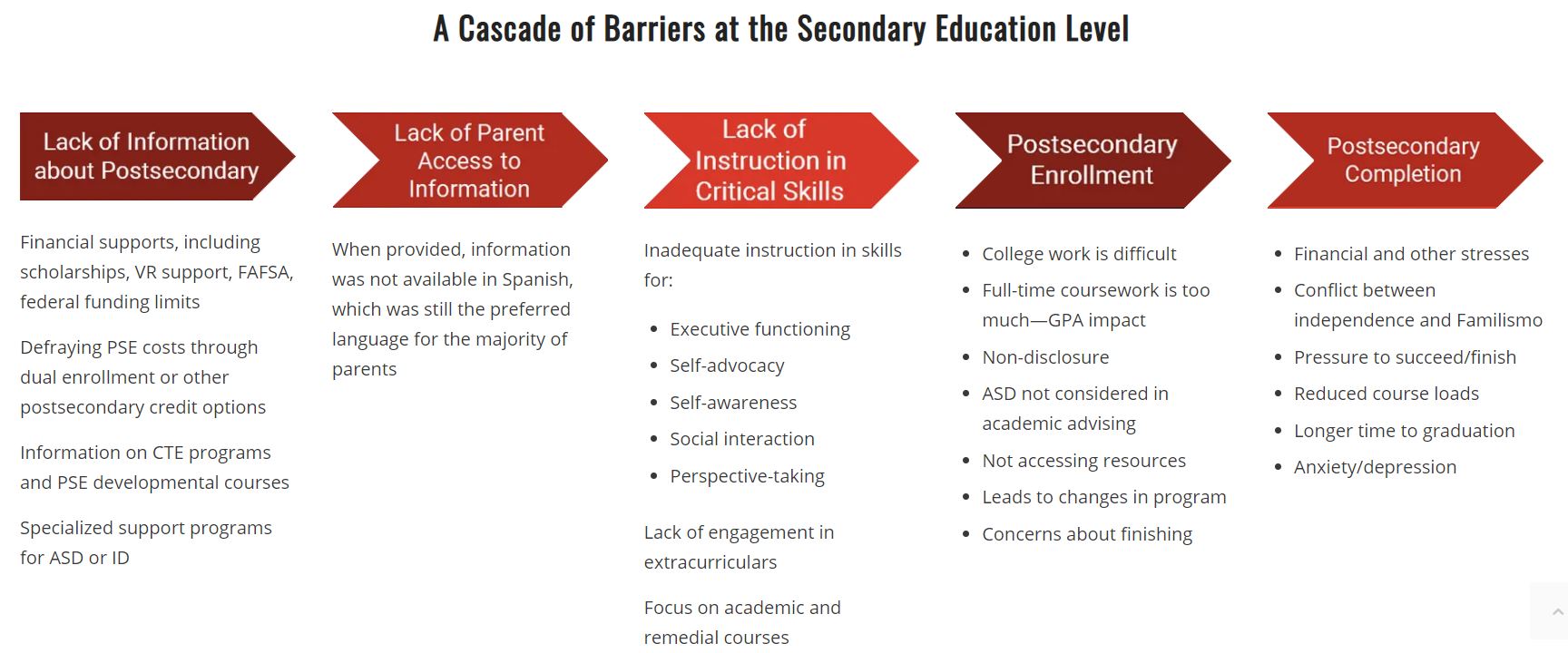
If you would like a certificate of completion, please answer the questions at the beginning of the video and include your email address.
Student Resources
Things to consider as you prepare for Postsecondary Education
There are things you can do in high school and earlier to prepare you for post-secondary education after high school.
- If you have an Individual Educational Plan (IEP), you should speak up in your IEP meetings to make sure your plan includes the help you need to succeed in school.
- By age 16, your plan should include your needs, preferences, and interests and list goals for employment, education/training, and independent living, as appropriate, for life after high school. The plan should address how these goals will be met and list any help you need to meet those goals.
- Consider taking career and technical education (CTE) courses in middle and high school to explore different career options, learn skills for a specific job, or earn industry certification in one of 17 career clusters.
- Consider taking dual-enrollment academic or CTE courses or other courses to earn college credit and cut college costs. Go to http://www.fldoe.org/policy/articulation for more information.
- You may choose to defer (put off) graduation and continue your high school education up to age 22, if you are enrolled in certain classes and this is noted in your IEP. See Family Guide for Secondary Transition Planning for Students with Disabilities at http://project10.info/DPage.php?ID=322 to learn more.
What do you need to work on to be ready for Postsecondary Education
Your Transition IEP should include the areas that you need to develop to be successful in postsecondary education. If you are not sure about the skills that are important for success after high school, watch this brief video, and make sure that your Transition IEP includes goals that will help you achieve your goal of succeeding in college.
The video will give you a tool, “STOP & THINK” to help you and your team remember the key components that challenge college success for students with autism spectrum disorders. If you don’t have an IEP, don’t worry! Working on these skills will give you the same chance at smooth sailing in college.
Resources for High School Students
Find Something New provides additional tools and resources to support individuals as they progress through college and into the workforce. This site can be used to find your career path or to better plan for college and financial aid.
https://findsomethingnew.org/resources/
Florida Department of Education’s Approved Middle School Courses for Career and Education Planning provides a listing of courses that fulfill the requirements for a career planning course before ninth grade.
http://www.fldoe.org/core/fileparse.php/7531/urlt/approved-courses.pdf
Florida Department of Education’s Career Cluster Infographic Fact Sheets are designed to give students information on career paths, education needed and CTE courses to explore a variety of high-demand fields.
http://www.fldoe.org/core/fileparse.php/5652/urlt/CareerClusterInfographics.pdf
Florida Department of Education’s College and Career Planning Educator’s Toolkit provides an overview of the middle grades career planning course requirements and planning tools for secondary education.
http://www.fldoe.org/academics/college-career-planning/educators-toolkit
Florida Department of Education High School Course Planning Sheet is a chart that can be used as a visual support for planning high school coursework.
http://www.fldoe.org/core/fileparse.php/7531/urlt/HighSchoolCoursePlan.pdf
Florida Ready to Work provides training and free courses to help individuals become more employable. This coursework can provide the skills needed to enhance communication, reasoning, and problem-solving.
https://www.floridareadytowork.com/jobseekers
FutureQuest Island is an interactive program to explore career options.
https://www.futurequestisland.org/#screen-login
Mi Proximo Paso/My Next Move provides online opportunities for career and post-secondary education exploration and planning.
https://www.mynextmove.org/ or https://www.miproximopaso.org/
O*net Online provides comprehensive occupational descriptions and data and a compendium of employment and career exploration linked to the national employment index.
Project 10 Transition Education Network’s Middle School Transition Trail Map provides a step by step plan for planning for secondary postsecondary, and career outcomes.
http://project10.info/Documents/Middle_School_Transition_Trail_Map_-_Final_7.28.2020.pdf
Project 10 Transition Education Network’s Benchmarks for Middle School Transition Planning highlights the evidence-based indicators of postsecondary success
http://project10.info/Documents/Benchmarks_for_MS_Transition_Planning_Final_7.27.20_docx_1_1.pdf
Project 10 Transition Education Network’s Career and Technical Education: Enhancing Educational Experiences in Middle School, High School and Postsecondary Education Provides guidance on steps to pursue CTE options as early as middle school. http://project10.info/Documents/CTE_SSTIC_Product_with_CTE_Option_4.17.2020.pdf
Topical Brief: http://project10.info/Documents/January_2019_Topical_Brief_Career_and_Techni.pdf
Project 10 Transition Education Network’s Collaboration for a Smooth Secondary Transition Topical brief provides guidance on appropriate transition supports. http://project10.info/Documents/July_2019_Topical_Brief_Collaboration_for_a_Smooth_Secondary_Transition.pdf
Think College’s Web-Based/Transition Assessments lists resources for assessing interests, abilities and work values for individuals with intellectual disabilities.
FCIHE Webinar: Independent Living & College Success. This webinar covers topics related to living on your own as a college student.
https://fcihe.com/event/fcihe-independent-living-college-success/
FCIHE: Webinar: What’s the difference between high school and college? This webinar explains differences between high school and post-secondary programs.
https://fcihe.com/event/whats-the-difference-between-high-school-college-webinar/
Find Something New provides additional tools and resources to support individuals as they progress through college and into the workforce. This site can be used to find your career path or to better plan for college and financial aid.
https://findsomethingnew.org/resources/
Finding your Way: A College Guide for Students on the Spectrum provides guidance for students preparing for transition to post-secondary education programs.
https://researchautism.org/findingyourway/
Florida Center for Students with Unique Abilities Planning for College Page provides resources and financial aid information on Florida’s postsecondary programs for students with intellectual disabilities.
https://fcsua.org/E_resources.php
National Collaborative on Workforce and Disability provides a workbook for youth to consider the benefits of disclosing and practice in how to do so effectively.
http://www.ncwd-youth.info/wp-content/uploads/2016/10/411_Disability_Disclosure_complete.pdf
NTACT: Resources for encouraging student participation in transition IEP meetings provides numerous resources for educators to encourage self-advocacy during IEP meetings. https://transitionta.org/system/files/resourcetrees/Resources%20for%20Involving%20Students%20in%20their%20IEP%20Process_2019.pdf?file=1&type=node&id=1908&force=
OAR: A Guide for Transition to Adulthood provides a comprehensive guide for parents and students as they consider secondary to post-secondary options.
https://researchautism.org/resources/a-guide-for-transition-to-adulthood/
Project 10 Standing Up for Me provides a self-determination and self-advocacy curriculum.
http://project10.info/files/SUFM_Participant_Materials_final.pdf
Students with Disabilities Preparing for Postsecondary Education: Know Your Rights and Responsibilities provides a student guide to rights and responsibilities at the post-secondary level.
https://www2.ed.gov/about/offices/list/ocr/transition.html
Think College Family Resources Page
Transition Coalition provides a series of training modules on transition support, including a module on cultural diversity.
https://transitioncoalition.org
Transition from School to Adulthood for Youth with Autism Spectrum Disorder: What We Know and What We Need to Know provides information regarding transition from high school to college and employment.
https://doi.org/10.1177/1044207313518071
Study.com has a guide titled “Guide to Starting College as a Student with Autism“:
https://study.com/resources/college-transition-independent-living-autism.html
Scholarly Articles
Beresford, B., & Mitchell, W. (2014). Young people with high-functioning autism and Asperger’s syndrome planning for and anticipating the move to college: What supports a positive transition? British Journal of Special Education, 41(2), 151-171. doi:10.1111/1467-8578.12064
https://nasenjournals.onlinelibrary.wiley.com/doi/abs/10.1111/1467-8578.12064
Brogdon, B., Cox, B. E., Edelstein, J., Roy, A., (2016). A Spectrum of Student Success: Identifying Factors Affecting Access, Experiences, and Outcomes for Students on the Autism Spectrum. College Autism Network, 1-35.
Chiang, Hsu-Min, Cheung, Y. K., Hickson, L., Tsai, L. Y., & Xiang, R. (2012). Predictive Factors of Participation in Postsecondary Education for High School Leavers with Autism. J Autism Dev Disord, 42, 685-696. doi: 10.1007/s10803-011-1297-7
https://pubmed.ncbi.nlm.nih.gov/21618065/
Dallas, B. K., Ramisch, J. L., & McGowan, B. (2015). Students with Autism Spectrum Disorder and the Role of Family in Postsecondary Settings: A Systematic Review of the Literature. Journal of Postsecondary Education and Disability, 28(2), 135-147.
https://eric.ed.gov/?q=Dallas%2c+B.+K.%2c+Ramisch%2c+J.+L.%2c+%26+McGowan%2c+B.+&id=EJ1074657
Los, J. E., Nasamran, A., & Witmer, S. E. (2017). Exploring Predictors of Postsecondary Outcomes for Students With Autism Spectrum Disorder. Education and Training in Autism and Developmental Disabilities, 52(4), 343-356. doi:10.1037/e603852013-001
https://eric.ed.gov/?id=EJ1160232
Manju, B., Donahue, A.T., Gobbo, K., & Shnulsky, S. (2017) College Students Who Have ASD: Factors Related to First Year Performance. Journal of Postsecondary Education and Disability, 30 (4). 373-382.
https://eric.ed.gov/?id=EJ1172785
McDaniel, S. & Hall, L. J. (February, 2018). The promise of extra-curricular club participation for high school students with autism spectrum disorder. Oral presentation at Council for Exceptional Children (CEC) conference, Tampa, FL.
Richardson, J. T. (2016). Academic attainment in students with autism spectrum disorders in distance education. Open Learning: The Journal of Open, Distance and E-Learning, 32(1), 81-91. doi:10.1080/02680513.2016.1272446
https://www.tandfonline.com/doi/abs/10.1080/02680513.2016.1272446?journalCode=copl20
Shattuck, P., Silverman, C., & Sosnowy, C. (2018). Parents’ and Young Adults’ Perspectives on Transition Outcomes for Young Adults with Autism. Autism, 22 (1), 29-39. Doi: 10.1177/1362361317699585
- Kirby, A. V. Bagatell, N. Baranek, G. T. (2020) The Formation of Postsecondary Expectations Among Parents of Youth with Autism Spectrum Disorder, Focus on Autism and Other Developmental Disabilities, 35(2), 118-128.
- Nachman, B. R. Enhancing Transition Programming for College Students with Autism: A Systematic Literature Review, Journal of Postsecondary Education, 33(1), 81-95.
- Wei, X. Wagner, M. Hudson, L. Yu, J. W. Javitz, H. (2016) The Effect of Transition Planning Participation and Goal-Setting on College Enrollment Among Youth with Autism Spectrum Disorders, Remedial and Special Education, 37(1), 3-14.
- McGee, E. Ahmed, B. Trujillo, C. (2021) Recommendations for Postsecondary Transitions for Autism Spectrum Disorder Based on Family Experiences, The American Journal of Occupational Therapy, 75(2).
- Jackson, S. L. T. Hart, L. Brown, J. T. Volkmar, F. R. (2018) Brief Report: Self-Reported Academic, Social, and Mental Health Experience of Post-Secondary Students with Autism Spectrum Disorder, J Autism Dev Disord, 48(1), 643-650.
- Eastman, K. Zahn, G. Ahnupkana, W. Havumaki, B. (2021) Small Town Transition Services Model: Postsecondary Planning for Students with Autism Spectrum Disorder, Rural Special Education Quarterly, 40(3), 157-166.
- Schaffer, G. E. Faber, A. J. Shafaie, S. M. Stageberg, D. Perceptions of High School and College Students with Autism Related to Their Obstacles and Strategies to Academic Success, Journal of Inclusive Postsecondary Education, 3(1), 1-28.
Affordability in the Florida College System presents an analysis of the challenges and approaches to making post-secondary education affordable. http://www.fldoe.org/core/fileparse.php/7724/urlt/FCS18-Affordability.pdf
FCIHE Webinar: Financial Aid for College
https://fcihe.com/event/how-to-pay-for-college-scholarships-financial-aid-more-webinar/
Find Something New provides additional tools and resources to support individuals as they progress through college and into the workforce. This site can be used to find your career path or to better plan for college and financial aid.
https://findsomethingnew.org/resources/
Florida Bright Futures Handbook lists Bright Futures scholarships, including
Florida Gold Seal CAPE Scholarships for students enrolled in certain career and technical education programs.
https://www.floridastudentfinancialaidsg.org/SAPBFMAIN/SAPBFMAIN
Florida Center for Inclusive Higher Education webinar focused on accessing scholarships
https://fcihe.com/event/how-to-pay-for-college-scholarships-financial-aid-more-webinar/
Project 10 Financial Planning for Postsecondary Education page:
http://project10.info/DPage.php?ID=198
VR Transition Program and Services provides services for both high school and post-secondary students, including support with funding education and securing a career.
Accommodations and Support Services for Students with Autism Spectrum Disorder (ASD): A National Survey of Disability Resource Providers https://eric.ed.gov/?id=EJ1153551
Nova Southeastern University: Access Plus is a comprehensive program for services, academic, residential and vocational support for NSU students with ASD.
http://www.nova.edu/humandevelopment/autism/access-plus/support-programs.html
Santa Fe College: Spectrum of Success helps to integrate students with ASD into the Santa Fe College community.
https://www.sfcollege.edu/drc/sos/index
Seminole State College: Full Spectrum Support facilitates successful adjustment and progression of Seminole State students with ASD in all domains of college life.
https://www.seminolestate.edu/dss/autism-spectrum-disorders
University of Florida: SOCIAL GATORS is a program for UF students who identify as students with ASD. The program focuses on assisting students with developing skills for social interactions, independent living, career seeking, and academics.
https://disability.ufl.edu/students/social-gators/
University of North Florida: THRIVE is an ASD support program that focuses on social skills, independent living skills, and career development skills.
https://www.unf.edu/drc/THRIVE_Program.aspx
University of West Florida: ARGOS for Autism provides academic, social, life skills, and career planning support to students with autism.
Disability Support Services provides information about navigating state colleges for students with disabilities.
FLDOE Technical Assistance Paper: Career and Technical Education Basic Skills Assessment Requirements addresses the basic skills requirements for completion of career and technical education career certification programs of 450 hours or longer.
http://www.fldoe.org/core/fileparse.php/5444/urlt/basic-skill-tap-att1.pdf
Florida Counseling for Future Education Handbook provides a listing of Florida State College credentials. https://dlss.flvc.org/documents/210036/217302/Florida+Counseling+for+Future+Education+Handbook.pdf/8e147e5f-857c-490e-be68-f145b084fc12
Florida Postsecondary Education Guide provides information on Universities, State Colleges, Career Centers, and Private Programs.
https://www.fddc.org/sites/default/files/DDCouncil_EducationGuide.pdf
Florida State Colleges, Florida DOE Division of State Colleges provides information on Florida state colleges.
A Parent and Teacher Guide in Section 504: Frequently Asked Questions addresses the differences between section 504 of the Rehabilitation Act of 1973 and the Individuals with Disabilities Education Act.
http://www.fldoe.org/core/fileparse.php/7690/urlt/0070055-504bro.pdf
College and Career Readiness and Success Center: How ESSA and IDEA Can Support College and Career Readiness for Students with Disabilities provides guidance on how these federal laws support the successful transition to post-secondary education and career development.
PACER: The ADA, Section 504 & Postsecondary Education explains the difference between the ADA and Section 504 and how they affect postsecondary education.
https://www.pacer.org/transition/resource-library/publications/NPC-42.pdf
Section 504 of the Americans with Disabilities Act, Subpart E – Postsecondary Education provides the full text of ADA components of section 504 related to post-secondary education.
https://www2.ed.gov/policy/rights/reg/ocr/edlite-34cfr104.html#E
Find Something New provides additional tools and resources to support individuals as they progress through college and into the workforce. This site can be used to find your career path or to better plan for college and financial aid.
https://findsomethingnew.org/resources/
Florida Abilities Work includes resources for job-seekers with disabilities and employers, and lists agencies that support employment, including CareerSource Florida and Career Source Centers.
www.abilitieswork.employflorida.com
Florida Department of Education’s Career Cluster Infographic Fact Sheets are designed to give students information on career paths, education needed and CTE courses to explore a variety of high-demand fields.
http://www.fldoe.org/core/fileparse.php/5652/urlt/CareerClusterInfographics.pdf
Florida Ready to Work provides training and free courses to help individuals become more employable. This coursework can provide the skills needed to enhance communication, reasoning, and problem-solving.
https://www.floridareadytowork.com/jobseekers
Mi Proximo Paso/My Next Move provides online opportunities for career and post-secondary education exploration and planning.
https://www.mynextmove.org/ or https://www.miproximopaso.org/
O*net Online provides comprehensive occupational descriptions and data and a compendium of employment and career exploration linked to the national employment index.
Project 10 Transition Education Network’s Career and Technical Education: Enhancing Educational Experiences in Middle School, High School and Postsecondary Education Provides guidance on steps to pursue CTE options as early as middle school.
http://project10.info/Documents/CTE_SSTIC_Product_with_CTE_Option_4.17.2020.pdf
Topical Brief: http://project10.info/Documents/January_2019_Topical_Brief_Career_and_Techni.pdf
Vocational Rehabilitation (Florida Department of Education’s Division of Vocational Rehabilitation) provides support to individuals with disabilities whose employment is impacted by their disability.
VR Customer Services provides an overview of VR services.
http://www.rehabworks.org/customers.shtml
Scholarly Articles
Briel, L. W., & Evans Getzel, E. (2014). In their own words: The career planning experiences of college students with ASD. Journal of Vocational Rehabilitation, 40, 195-202. doi:10.3233/JVR-140684
http://centerontransition.org/documents/publications/career_planning.pdf
Domin, D., & Sulewski, J. (2019). VR’s Role in the Seamless Transition from Higher Education to Employment. VR and Youth Rehabilitation Research and Training Center Practice Brief.
Kurtz, A and Jordan, M. (2008) Supporting Individuals with Autism Spectrum Disorders: Quality Employment Practices, Institute for Community Inclusion, University of Massachusetts Boston.
https://www.communityinclusion.org/article.php?article_id=266
Agency for Persons with Disabilities (APD): Employment Enhancement Project provides resources to assist persons who are on the iBudget waiting list with securing employment.
http://apd.myflorida.com/customers/supported-employment/
Arc of Florida provides resources and supports for individuals with intellectual disabilities
Disability Rights Florida provides advocacy and legal protection services for individuals with disabilities in Florida. See topical papers. http://www.disabilityrightsflorida.org/resources/disability_topics
Employment First Florida supports competitive integrated employment for persons with disabilities.
http://www.employmentfirstfl.org/
Family Café provides an annual conference and resources for families of individuals with disabilities.
Florida Alliance for Assistive Services and Technology (FAAST) provides assistive technology equipment loans, evaluations, and other resources.
Florida Centers for Autism and Related Disabilities (CARD) Seven regional centers provide support and assistance for persons with these disabilities, as well as training and technical assistance to post-secondary education programs and their faculty and staff.
Florida Center for Students with Unique Abilities provides a wide array of resources that support the development of inclusive postsecondary education for students with intellectual disabilities, including a team planning tool and institutes, webinars, institutes, and student and family and transition planning resources.
Florida Consortium for Inclusive Higher Education provides resources on a range of topics, including program development, independent living, career and employment, and more.
Florida Department of Education Bureau of Exceptional Education and Student Services (BEESS) oversees exceptional student education for students with disabilities, including autism, in Florida.
http://fldoe.org/academics/exceptional-student-edu
Florida Department of Education Division of Career and Adult Education oversees career and technical education and adult education for the state of Florida.
http://fldoe.org/academics/career-adult-edu/
Florida Developmental Disabilities Council, Inc. provides resources on a variety of topics relevant to families and individuals with intellectual and developmental disabilities. Many items are available in English and Spanish.
Florida Diagnostic and Learning Resources System (FDLRS) provides instructional support for technology, professional development training, and other resources to support district exceptional education programs and families of students with disabilities.
Project 10 Transition Education Network provides a wealth of information for Florida professionals, students with disabilities, and their families on planning for transition to adulthood.
Vocational Rehabilitation (Florida Department of Education’s Division of Vocational Rehabilitation) provides support to individuals with disabilities whose employment is impacted by their disability.
VR Customer Services provides an overview of VR services.
http://www.rehabworks.org/customers.shtml
Vocational Rehabilitation: Ticket to Work Program describes a work incentive program for persons who are receiving Social Security benefits based on their disability.
www.rehabworks.org/ticket.shtml
Vocational Rehabilitation Transition Program and Services provides services for both high school and post-secondary students, including support with funding education and securing a career.
http://rehabworks.org/docs/flyers/TransitionYouth.pdf
National Resources
Autism Speaks provides resources for individual and family support.
Division on Career Development and Transition (DCDT) A division of the Council for Exceptional Children (CEC). Promotes national/international efforts to improve career/vocational and transition services for individuals with disabilities.
https://community.cec.sped.org/dcdt/home
Family Network on Disabilities provides resources and training programs for persons with disabilities and families.
Organization for Autism Research (OAR) provides resources for people with ASD, their families, and support professionals to promote evidence-based practice.
Think College provides resources and training to support individuals with intellectual disabilities to attend post-secondary education programs, including resources for families. This site can be searched for extensive resources available in the Resource Library.
Scholarly Articles
Metty, W. (2019) Transition Contacts Meeting Part 1. FL: Florida Department of Education.
http://project10.info/Documents/Transition_Contacts_Meeting_FINAL.pdf
I’m Determined
This website is sponsored by the Virginia Department of Education and houses a plethora of self-determination resources.
Standing Up for Me – Plus (SUFM+)
This curriculum for high school students is available by contacting your Regional Transition Representative for a training. *Note: this curriculum can be used in full or in part. Many lessons include bell-ringer ideas that can easily be used in multiple educational settings.
http://project10.info/DPage.php?ID=331#NS84
Transition Assessment Chart
This document provides a list of formal and informal transition assessments that range from aptitude tests to questionnaires and interest inventories. Information for finding the assessments online is provided.
http://project10.info/Documents/Transition_Assessment_Chart_3.19.21_1_2.pdf
Zarrow Center for Learning Enrichment
This website contains free self-determination curriculum and student assessments.
https://www.ou.edu/education/centers-and-partnerships/zarrow
What is Postsecondary Education?
How can I afford Postsecondary Education?
When should I start planning for Postsecondary Education?
As soon as possible! It is never too early, and never too late to begin taking steps to prepare for postsecondary education.
The journey of 10,000 miles begins with a single step.
Florida-specific resources for postsecondary planning can be found at Project-10 Transition Education Network, but there are other resources you may also find helpful. We have assembled some below for you to explore.
English Resources
If you or your parents feel more comfortable with resources in Spanish, please check out these resources:
Spanish Resources
What supports are available for me at college?
Colleges have supports for students with ASD, but you must ask for them. Learn more about how to get help and why you should set things up early for success in this short video.

